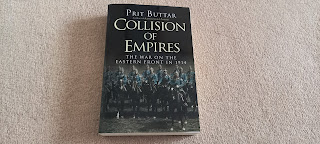THE WAR ON THE EASTERN FRONT IN 1914.
Sometime ago I reviewed a book from my library about the Eastern Front during WW1. As a result I decided I needed to learn more about these fascinating campaigns. After some research I found a series of four books written by Prit Buttar, who is a distinguished British based historian of the Eastern Front in both wars. This is the first of that set of books and covers the fighting in 1914.
The book is very well written and seriously well researched. Although it focuses on the actual battles it also covers the leading personalities and the political and economic situations in the three main protagonists, Germany, Russia and Austria-Hungary. The see-saw nature of the fighting, the dreadful loss of life and the terrible ground conditions are also discussed in depth.
It is clear that the fighting of 1914 broke the back of the kuk ( Austria-Hungary) army. A rather fragile force to start with, it never quite recovered from the huge casualties it sustained in those first few months. In fact I had not realised just how heavy the casualty lists were. We are all clear as to the size of the loss on the Western Front but in fact those on the Eastern Front were equally large and in fact, the number of prisoners, on all sides, was much greater than in the West.
Although there was significant trench fighting it was on a much lower level than in the West. The distances involved meant there was always a flank that could be turned. Logistic issues also played a major role particularly in the offense where it proved impossible for an advance to go further than about 70 miles beyond railhead without a substantial pause for the railhead to move forward. In fact the Eastern campaign was always a war of maneuver similar to the first few months of 1914 in the West.
Overall an excellent book about a comparatively unknown campaign and highly recommended if you want to know about the Eastern Front in WW1.

Thanks for the review Tony and certainly a neglected theatre, but one with lots to offer the wargamer. I read Max Hastings book on 1914 and the build up to the war, which is also an excellent read.
ReplyDeleteHi Steve... Yes the Eastern campaign has huge wargame potential. Lots of maneuver and logistical issues. It demonstrated clearly the problem of using railways for strategic supply and horse drawn wagons for tactical supply. RTegards.
DeleteAnother thank you for the review from me, I have some knowledge of the Eastern Front in WW1, but not particularly of the Austrian side of the fighting.
ReplyDeleteI do have a recommendation by return - 'Tannenberg - the first thirty days in East Prussia' by Sir Edmund Ironside. It is a really good, in-depth account of the early battles between two Russain armies and the rather 'ad-hoc' German forces under the command of Hindenburg and Ludendorff. It includes details of the structure, organisation and equipment of the opposing forces and lots of detailed maps. Long out of print, you will have to look in a good library or the sdecond hand military book catalogues I am afraid
Hi Ian.... Thanks for the recommendation. I will have a look for this book. The book I have reviewed is very extensive, not only are battles fully described but also the armies, tactics and even the politics. It really is a comprehensive study. The other books, which I have bought already, cover the rest of the war on an annual basis.Regards.
DeleteHaving read the Hastinds book, the impression I have is that the eastern front as winter drew in was probably even more miserable a theatre of war than was Flanders - bleaker and even poorer. It is interesting to contrast the opinions of Hastings and Cyril Falls, author of 'Caporetto, 1917', on the topic of the generalship of Conrad von Hotzendorff. Hastings quotes Conrad himself as his being derserving of a firing squad; Falls takes a far more generous view.
ReplyDeleteI'll be keeping an eye out for the Buttar book.
Hi Ion.. Having almost finished reading three of the four Buttar books I can say they really are very good. Yes the conditions on the Eastern front were terrible especially in winter. The country was very poor, rough and supply lines were tenuous at best. As for Conrad I have no doubt at all that a firing squad was richly deserved. He was very much responsible for much of the kuk failings especially given his pre war role in training and equipping the army. Much like the Russians, the kuk appointed senior officers based on politics not ability. Regards.
Delete